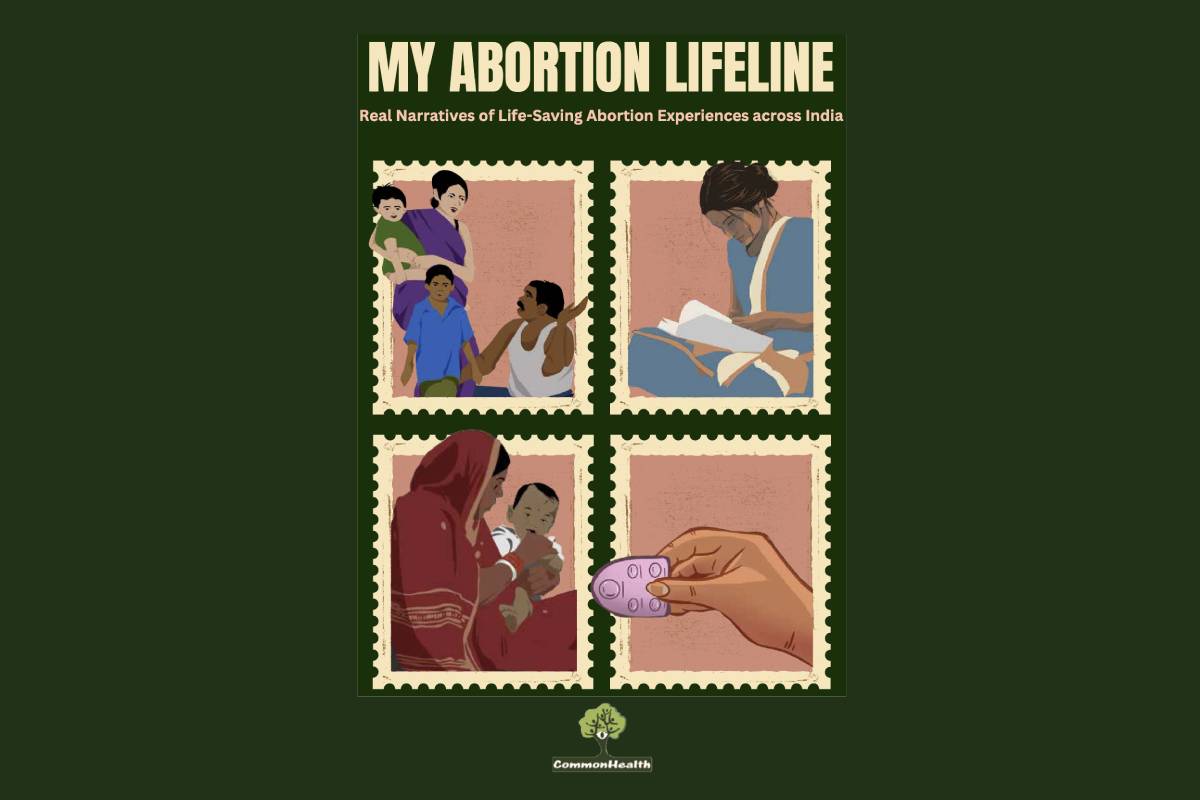
by CommonHealth
“A pregnant person’s body has long been a contested terrain, claimed by patriarchal forces and entrenched social structures that seek to define, control and restrict – robbing them of reproductive autonomy. In India, even with the liberalised Medical Termination of Pregnancy Action (MTP 1971) and its amendments, access to safe, compassionate abortion care remains a struggle for countless individuals.
“Yet, amidst these challenges, there exists another truth – one rarely documented and even less often celebrated: the profound relief, empowerment and joy experienced by those who access safe abortion care, often after overcoming insurmountable hurdles. At its essence, abortion is an act of restoring agency, overcoming insurmountable hurdles. At its essence, abortion is an act of restoring agency, reclaiming power over one’s body, and envisioning a self-determined future.
“This collection of stories is the culmination of CommonHealth’s Lifeline Campaign, created to mark International Safe Abortion Day on 28th September 2024. In a time of escalating global challenges to reproductive rights and autonomy, this campaign was conceived as a counter-narrative to the anti-choice rhetoric that paints abortion as “anti-life”, cruel and inhumane. Such framing, steeped in stigma and moral policing, perpetuates harmful myths and denies people access to life-saving care. The Lifeline Campaign set out with an unequivocal goal: to reclaim the language of life and affirm that safe, legal abortion is not just a fundamental human right—it is essential to individual well-being, public health, and reproductive justice.
“We issued a nationwide call for personal stories, inviting individuals to share their experiences with abortion—whether accessed through formal healthcare systems or alternative methods, including over-the-counter medication or unregulated providers. We believe these narratives are crucial in demonstrating that restrictions on abortion access do not prevent abortions from occurring but rather push individuals to seek potentially unsafe alternatives.
“Drawing on CommonHealth’s expansive grassroots network of partner organisations spanning diverse communities across India, we captured the voices of those often left unheard. Among these 29 stories are the voices of young people, mothers, migrant workers, rural women, widowed women, and several others—each narrative a testament to their resilience, courage, and determination to reclaim control over their bodies and destinies. By centering these stories, we reaffirm that reproductive justice is inextricably linked to human dignity and freedom. To honour the authenticity of these experiences, the stories have been only lightly edited, with some translated into English for uniformity while preserving the essence of the original narratives.”
Contents
Part I. Transforming young lives through the lifeline of choice
Part II. The lifeline of choice for mothers and parents
Part III. Navigating a labyrinth of barriers
Part IV. Support systems as enablers of access
Part I.
1. Reclaiming my destiny: The choice that saved my future
“I was 17, about to start college in Delhi. It was in the last week before leaving my hometown that my boyfriend and I… it happened so fast. We weren’t prepared, just caught up in the moment. When I missed my period shortly after, I panicked and ran to my friend. I wouldn’t have dared go to a doctor. I couldn’t risk my parents finding out – they would’ve never let me pursue my education. I knew I wasn’t ready to be a mother. Not terminating that pregnancy would have ruined my life, my career, everything. In my desperation, I bought abortion pills from a pharmacy. I watched a video online, trying to figure out what to do, and then I waited. When I started bleeding, my friend took me to a private clinic. Looking back, I should have gone there first, but I didn’t know any better. I was too caught up in shame and fear. I think about that day sometimes, wondering what would have happened if I didn’t have those pills, my friend, and the doctor who made sure I was okay. My abortion saved my life because it gave me the choice to decide the course of my own future. Now, I’ve completed my master’s degree and I’m working a job I like in a metro city. Can you imagine what would have happened if I hadn’t gone through with the abortion that day? I can’t either. Nobody knows about this – not even my boyfriend at the time. It’s a secret I’ve carried, but it’s shaped who I am today.” – M, Mumbai
+ + +
High Court bars abortion in absence of pregnant 17-year-old’s consent
Bhopal/Jabalpur: The Madhya Pradesh High Court has declined to allow medical termination of pregnancy of a 17-year-old rape survivor because it would be against her wishes, while also refusing to let her continue living with the man accused of raping her.
During the hearing of the case, referred to by a sessions court at Mauganj, Rewa, seeking medical termination of the pregnancy, the High Court was told that the survivor lives with the rape accused. She has refused to undergo medical tests and surgery for a termination of pregnancy.
The Mauganj court had sent a communication to the high court, seeking permission for a termination of pregnancy of the survivor, who has a 25-week pregnancy. The court was, however, informed on behalf of the state government that the girl says she has an ongoing affair with the accused, she lives with him in his house, and she doesn’t want an abortion.
A bench of justice Vishal Mishra said being a minor, she would either have to go with her parents or live in ‘Nari Niketan’ at Rewa till she becomes an adult. The court asked to inform SP, Rewa, about the boarding of the girl at ‘Nari Niketan’ and said the shelter home superintendent should take all the precautions during her stay there.
[Editor’s Note: In India, because the law criminalises all sex between minors, even consenting sex, this girl is effectively being imprisoned in a children’s shelter.]
SOURCE: Times of India, 19 July 2025.



